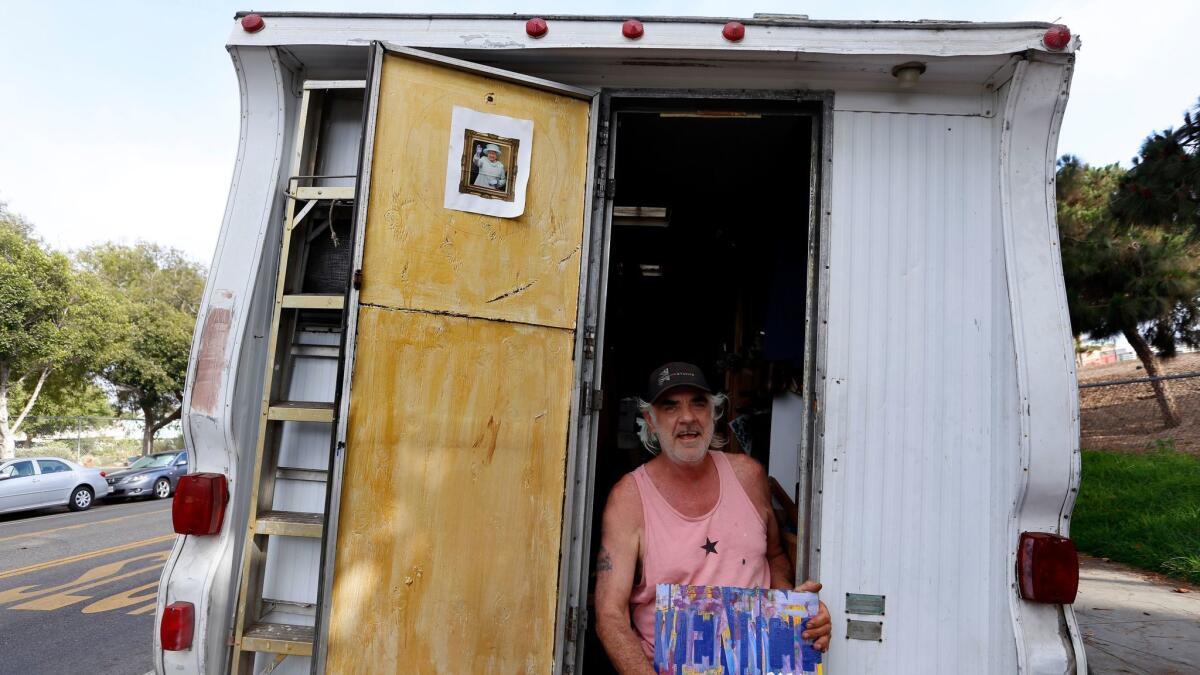L.A. City Council bans sleeping in vehicles near homes, schools

- Share via
A day after voters handed Los Angeles $1.2 billion to build supportive housing, the City Council on Wednesday adopted a nighttime ban on living in vehicles near homes, parks and schools, over objections from advocates who contend the measure will criminalize thousands of homeless people.
A 1983 measure prohibiting vehicle-dwelling citywide had been a key enforcement tool as the city sought to control growing homelessness. That law was struck down two years ago by the 9th U.S. Circuit Court of Appeals, which held that it was an invitation to discriminate against homeless people.
Council members said the new city ban legalizes living overnight in vehicles for the first time by permitting parking and sleeping in industrial or commercial districts from 9 p.m. to 6 a.m. The ordinance cites unsanitary conditions, noise and crime in support of the ban and says vehicle-dwelling “diminishes the economic viability of the city and its many tourist attractions.”
“There are hundreds of thousands of people … who are concerned people have turned their curbs into an apartment,” Councilman Marqueece Harris-Dawson, who represents parts of South Los Angeles, said during the council’s brief public hearing. “That’s just not fair to anybody.”
Westside Councilman Mike Bonin said half the city’s streets will be open for overnight parking, but advocates objected that block-by-block regulations adopted in the wake of the court decision severely limit homeless people’s options. The new law will banish working mothers with children to isolated and dangerous corners of the city far from work or school, they said.
“There are a lot of working families that live in their cars,” Venice resident Mike Chamness testified during the hearing. “There is nowhere in Venice where you can park your car and sleep in your vehicle.”
Bonin said a plan to develop parking lots where homeless people can sleep was making its way through the city approval process, but speakers assailed officials for pushing enforcement before the alternatives are in place.
Mayor Eric Garcetti’s spokeswoman did not immediately respond when asked whether he would sign the measure into law. Voters on Tuesday overwhelmingly approved a $1.2-billion bond measure designed to fund construction of 10,000 apartment units over 10 years for medically vulnerable homeless people living in the streets for a year or more.
The old law had prohibited people from using a vehicle parked on a city street or in a municipal or county parking lot as “living quarters” — both overnight and “day-by-day, or otherwise.”
The 9th Circuit said the law failed to define “living quarters” or specify what “otherwise” meant. The court’s ruling also said the city’s ban had resulted in “arbitrary and discriminatory enforcement.”
“It appears to be applied only to the homeless,” Judge Harry Pregerson wrote in the decision.
Civil rights lawyers asserted Wednesday that the new law’s definition of “dwelling,” which includes possessing a blanket or bedroll or preparing a meal, could apply to any driver stopping to rest or eat on the road.
“I have some of these items in my car I keep for emergencies,” said Carol Sobel, who brought the lawsuit that overturned the old law.
If it’s only used against homeless people, the new law would also be discriminatory, said the attorneys, who raised the prospect of another lawsuit.
Lawyer Gregory Bonett of Public Counsel, a public interest legal group, faulted the council for adopting the ban on a day’s notice at a special meeting “barely 24 hours after a high-stakes election.”
“This should have been done at a regular meeting,” he said.
Lawyers also objected to subjecting homeless people to criminal infractions and $25 fines instead of administrative penalties. They said the law could put homeless people in the peculiar circumstance of having to get out of their vehicles to sleep on sidewalks, which is permitted under a court settlement.
Attorney Shayla Myers of the Legal Aid Foundation of Los Angeles said court costs and state fees would blow fines up to several hundred dollars, exposing homeless people to jail for failure to pay.
Pete White of Los Angeles Community Action Network, whose members made phone calls and knocked on doors in support of the homeless housing issue, Measure HHH, said, “We can’t do all this hard work and celebrate and then the day after use that as a political invitation to further criminalize people who are poor, possibly jeopardizing the beneficiaries of the housing.”
The city, in a written report, ruled out administrative remedies because homeless people’s addresses are unreliable or nonexistent.
The new ordinance, if signed into law, would be revisited in July 2018 after a study of the number of occupied vehicles; the impacts on public health, safety and the environment; and the effectiveness of the new regulations.
Times staff writer Jon Schleuss contributed to this report.
Twitter: @geholland
UPDATES:
7:35 p.m.: This article was updated with additional editing.
This article was originally posted at 5:35 p.m.
More to Read
Sign up for Essential California
The most important California stories and recommendations in your inbox every morning.
You may occasionally receive promotional content from the Los Angeles Times.














